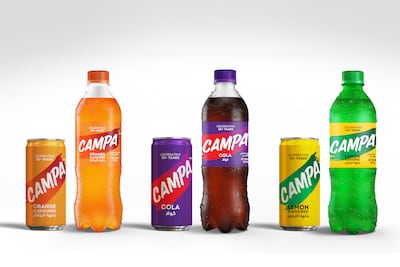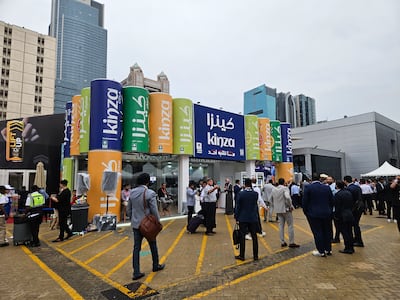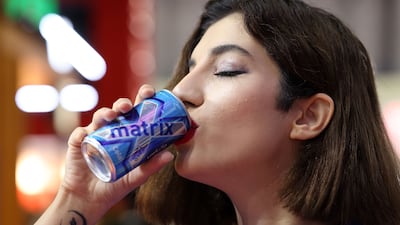Soft drinks companies across the region are enjoying a sales boom as customers seek out alternatives to traditional US market leaders Pepsi and Coca-Cola, experts at Gulfood in Dubai said.
The Middle East and Africa carbonated beverages market was worth $21.7 billion in 2024 and is projected to reach $26.3 billion by 2032, according to Market Data Forecast.
While soft drinks have historically been popular across the region, demand for big-name alternatives is being driven by the Palestinian-led Boycott, Divestment and Sanctions movement, which campaigns against brands it accuses of links with Israel, including Coca-Cola and PepsiCo, experts said.
In the UAE, there is also a big push towards healthier, sugar-free alternatives, as well as an energy drinks boom that's creating huge opportunities for companies in the industry.
On the rise
Jordan's Defaf Al-Nahrayn Company, which owns Matrix Cola, has seen a 200 per cent rise in sales since December 2023, export manager Firas Hamdan told The National.
While the company was first established in 2008, it spent more than a decade catering to the demand for affordable alternatives in underdeveloped countries in Africa. After the Gaza war began in October 2023 and boycotts gained momentum, the company saw an opportunity to expand within the region. Reports indicate PepsiCo and Coca-Cola still enjoy growth in some Middle East markets, but western beverage brands faced a 7 per cent decline in sales in the first half of 2024 across the region, according to market researcher NielsenIQ.
"In Jordan alone from April to September last year, we had a shortage because demand was so huge," said Mr Hamdan. "It started because of the boycott but after that the brand itself was already established in the market and people started asking for Matrix by name."
The brand is now available in 45 countries and at Gulfood the company has finalised a deal to distribute widely in the UAE. "We're expanding globally right now," he said, adding that over the past two days they have also been approached by distributors across the world, including India, the US and Europe.
Alsi Cola, which has been present in the Saudi Arabia market for more than 30 years, has also witnessed a surge in sales across the region, particularly in Oman and Jordan, in part due to the boycott, Ahsan Shams, sales manager of group company Coral General Trading, told The National. "We have almost 60 to 70 per cent of market share in Saudi Arabia ... and we are growing very fast in this region. We have also been approached by the American and Latin American market, even Europe," he said.
Indian legacy brand lands in UAE
Campa Cola, a flagship brand from India revived in 2023 by Reliance Consumer Products, announced its entrance into the UAE market on Tuesday at Gulfood.

Chief executive Ketan Mody said the company was keen to serve the UAE's sizeable Indian population.
“The UAE, in a way, is very similar to India whereby they always prefer heritage brands and a proposition of global quality products at affordable prices, so it works out,” he told The National.
Nida Zeeshan, a representative for Pakola, a 75-year-old soft drinks brand from Pakistan, said they’ve seen exponential growth in their home market over the past year, specifically due to the boycotts. Pakola is owned by Mehran Bottlers Limited, a manufacturer and retailer of various carbonated beverages, but it is most famous for its flagship product launched in 1950. “We've got a lot of brands in Pakistan … and all of them have had phenomenal [growth]. Some are new, some are old, but even though they'd been there for a while, they were never out there like the way they are now,” she said.
Dubai's appetite for healthier alternatives
Warwick Gird, general manager of marketing at Spinneys Dubai, said the local supermarket chain has also seen rising interest in energy drinks. “We are seeing customers looking for ‘better for you’ soda alternatives like sparkling flavoured water with zero calories or functional beverages like clean energy drinks.”
One brand trying to capitalise on this trend is Egypt’s Healthy and Tasty, which launched its aspartame and sugar-free Healthy Cola five months ago. It now has manufacturing plants in Saudi Arabia and is also in the process of setting up local production in the UAE. “The Saudi market is huge, but there is a lot of demand for health products in the UAE,” said export development director Tamer Gharib. He added that they have also received huge interest from the US and Canada during Gulfood.
Saudi Arabia’s Milaf Cola, the world’s first carbonated soft drink made from dates, also has a buzzing exhibition stand at Gulfood. The kingdom’s Minister of Agriculture officially launched the product in December as part of Thurath Al Madina, a subsidiary of the Saudi Public Investment Fund.

Meanwhile, another Saudi brand, Kinza, which launched in 2022, is a title sponsor at the Dubai event. It has seen huge demand for its products across the Gulf and is looking to distribute more widely in the UAE, although a representative told The National they have seen less interest in the Emirates when compared to other regional markets.
Dubai resident Danielle Kamar said there is a clamour for alternatives in the UAE. She started the Instagram account @heartlocal_dxb after she saw more consumers turning away from major global brands and said her followers often ask her to suggest local alternatives to Coca-Cola.
“This is the most frequent request that comes back to Heart Local for a home-grown alternative, especially during gathering seasons like the winter holidays and now pre-Ramadan,” she told The National. “There seems to be a clear appetite to replace those everyday, almost knee-jerk purchases that wouldn’t be thought of twice – like Coke or Pepsi for guests – with a UAE-born option.”
Ms Kamar now directs her followers to Shams, a UAE-made, caffeine-free organic cola that is made with only five ingredients, including agave syrup for sweetness, capitalising on these clear local consumer trends. “[It is] not only home-grown, but health-conscious, too,” she said. “I’m really glad this has been made.”

